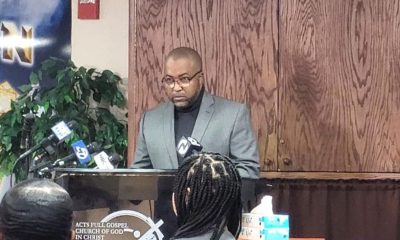Politics
Privacy Advocates Seek More Openness on NSA Surveillance

This June 6, 2013 file photo shows the sign outside the National Security Agency (NSA) campus in Fort Meade, Md. (AP Photo/Patrick Semansky, File)
ERIC TUCKER, Associated Press
WASHINGTON (AP) — As Congress considers whether to extend the life of a program that sweeps up American phone records, privacy advocates and civil liberties groups say too much about government surveillance remains secret for the public to fully evaluate the program’s reach or effectiveness.
The disclosure two years ago of the National Security Agency’s surveillance efforts prodded the federal government to declassify reams of once-secret documents, including opinions from a secretive intelligence court laying out the program’s origins and legal underpinnings. But critics say key language from the disclosed documents remains censored, the release of information has been selective, and the ongoing trickle of once-secret memos has raised concerns about how many other potentially illuminating documents might yet remain outside the public’s reach.
“That means the public lacks information it needs to understand the significance of the powers that government already has and the significance of the powers that the government is asking for,” said Jameel Jaffer, deputy legal director of the American Civil Liberties Union.
The NSA program that collects and stores phone records is conducted under Section 215 of the USA Patriot Act. The extent of its reach remained secret until Edward Snowden, a former NSA systems administrator, disclosed details of the surveillance in 2013. Amid a public backlash, President Barack Obama has proposed that the NSA stop collecting the records in bulk and instead request them from phone companies as needed for terrorism investigations. Congress is now deciding whether to renew or modify the phone records collection when the law authorizing it expires in June. Legislation is expected to be unveiled Wednesday in the House.
Intelligence officials say the program — it collects the “to” and “from” information on phone calls but not their content — is critical to detecting terrorist plots and have sought to justify it through the ongoing declassification of materials, including from the Foreign Intelligence Surveillance Court. Among documents released are court opinions outlining how the NSA was first authorized to start collecting bulk phone and Internet records in the hunt for al-Qaida terrorists, previously classified testimony from intelligence officials and NSA analyst training materials.
The disclosures far surpass available public information on other secret programs such as targeted drone strikes against terror suspects. But there are gaps in the information that privacy advocates say prevent the public from being able to fully judge the program’s effectiveness, including the extent to which Section 215 has been construed to allow for other types of bulk collection. Knowing how the government interprets its surveillance authorities, and how broadly they reach, is critical, advocates say.
“If the government is asking for the renewal of this authority, the public has a right to know at least in general terms how the authority is being used, and right now the public doesn’t have that,” Jaffer said.
Last month, a federal judge in New York held in a public records lawsuit that the government could lawfully withhold any secret ruling regarding the use of Section 215 to collect records other than bulk phone records. The judge, William Pauley, said the government had “offered a reasoned and persuasive argument for withholding” information that should not be second-guessed. In that same case, the Justice Department last year released a couple dozen surveillance court rulings but refused to turn over unspecified others, the exact number of which it said was classified.
The government continues to pull back the curtain with periodic new disclosures, such as the Justice Department’s release in January of a 5-year-old memo that said the Commerce Department was not obligated under Section 215 to turn over confidential census data to federal law enforcement. But such disclosures, though welcomed by civil liberties groups, also hint at how much might still be unknown.
The NSA program has also highlighted broader concerns about what privacy advocates say is the federal government’s overreliance on secretive court rulings and classified legal memos. Sen. Ron Wyden, D-Ore., a member of the Senate Intelligence Committee who opposes the bulk phone records collection, said while he believed the government had released enough information about the law — albeit under pressure — for an informed debate, he was nonetheless concerned about the role of secret legal interpretations.
Though intelligence agencies should be able to conduct secret operations, he said, “they shouldn’t be following secret law.”
Stephen Vladeck, an American University law professor, said it was possible that the debate about the phone records program distracts attention from other surveillance efforts that are perhaps more secretive, such as Executive Order 12333, which authorizes foreign intelligence collection overseas without a court order. He also said he thought the government had provided substantial information about what information it was collecting, but was less forthcoming about how that information was used.
“The conversation about collection and a conversation about use are very different conversations,” he said. “And to have one without the other is to, I think, underappreciate the privacy consequences of each.”
Liza Goitein, co-director of the liberty and national security program at the Brennan Center for Justice, said it was impossible to know how much information might be out there absent a complete index of how many memos, opinions or court orders even exist.
“We shouldn’t be satisfied that we know everything” because, Goitein said, “we have no way to assess that we know everything.”
Copyright 2015 The Associated Press. All rights reserved. This material may not be published, broadcast, rewritten or redistributed.
Bay Area
MAYOR BREED ANNOUNCES $53 MILLION FEDERAL GRANT FOR SAN FRANCISCO’S HOMELESS PROGRAMS
San Francisco, CA – Mayor London N. Breed today announced that the U.S. Department of Housing and Urban Development (HUD) has awarded the city a $53.7 million grant to support efforts to renew and expand critical services and housing for people experiencing homelessness in San Francisco.

FOR IMMEDIATE RELEASE:
Wednesday, January 31, 2024
Contact: Mayor’s Office of Communications, mayorspressoffice@sfgov.org
***PRESS RELEASE***
MAYOR BREED ANNOUNCES $53 MILLION FEDERAL GRANT FOR SAN FRANCISCO’S HOMELESS PROGRAMS
HUD’s Continuum of Care grant will support the City’s range of critical services and programs, including permanent supportive housing, rapid re-housing, and improved access to housing for survivors of domestic violence
San Francisco, CA – Mayor London N. Breed today announced that the U.S. Department of Housing and Urban Development (HUD) has awarded the city a $53.7 million grant to support efforts to renew and expand critical services and housing for people experiencing homelessness in San Francisco.
HUD’s Continuum of Care (CoC) program is designed to support local programs with the goal of ending homelessness for individuals, families, and Transitional Age Youth.
This funding supports the city’s ongoing efforts that have helped more than 15,000 people exit homelessness since 2018 through City programs including direct housing placements and relocation assistance. During that time San Francisco has also increased housing slots by 50%. San Francisco has the most permanent supportive housing of any county in the Bay Area, and the second most slots per capita than any city in the country.
“In San Francisco, we have worked aggressively to increase housing, shelter, and services for people experiencing homelessness, and we are building on these efforts every day,” said Mayor London Breed. “Every day our encampment outreach workers are going out to bring people indoors and our City workers are connecting people to housing and shelter. This support from the federal government is critical and will allow us to serve people in need and address encampments in our neighborhoods.”
The funding towards supporting the renewal projects in San Francisco include financial support for a mix of permanent supportive housing, rapid re-housing, and transitional housing projects. In addition, the CoC award will support Coordinated Entry projects to centralize the City’s various efforts to address homelessness. This includes $2.1 million in funding for the Coordinated Entry system to improve access to housing for youth and survivors of domestic violence.
“This is a good day for San Francisco,” said Shireen McSpadden, executive director of the Department of Homelessness and Supportive Housing. “HUD’s Continuum of Care funding provides vital resources to a diversity of programs and projects that have helped people to stabilize in our community. This funding is a testament to our work and the work of our nonprofit partners.”
The 2024 Continuum of Care Renewal Awards Include:
- $42.2 million for 29 renewal PSH projects that serve chronically homeless, veterans, and youth
- $318,000 for one new PSH project, which will provide 98 affordable homes for low-income seniors in the Richmond District
- $445,00 for one Transitional Housing (TH) project serving youth
- $6.4 million dedicated to four Rapid Rehousing (RRH) projects that serve families, youth, and survivors of domestic violence
- $750,00 for two Homeless Management Information System (HMIS) projects
- $2.1 million for three Coordinated Entry projects that serve families, youth, chronically homeless, and survivors of domestic violence
In addition, the 2023 CoC Planning Grant, now increased to $1,500,000 from $1,250,000, was also approved. Planning grants are submitted non-competitively and may be used to carry out the duties of operating a CoC, such as system evaluation and planning, monitoring, project and system performance improvement, providing trainings, partner collaborations, and conducting the PIT Count.
“We are very appreciative of HUD’s support in fulfilling our funding request for these critically important projects for San Francisco that help so many people trying to exit homelessness,” said Del Seymour, co-chair of the Local Homeless Coordinating Board. “This funding will make a real difference to people seeking services and support in their journey out of homelessness.”
In comparison to last year’s competition, this represents a $770,000 increase in funding, due to a new PSH project that was funded, an increase in some unit type Fair Market Rents (FMRs) and the larger CoC Planning Grant. In a year where more projects had to compete nationally against other communities, this represents a significant increase.
Nationally, HUD awarded nearly $3.16 billion for over 7,000 local homeless housing and service programs including new projects and renewals across the United States.
Activism
Oakland Post: Week of April 17 – 23, 2024
The printed Weekly Edition of the Oakland Post: Week of April 17 – 23, 2024

To enlarge your view of this issue, use the slider, magnifying glass icon or full page icon in the lower right corner of the browser window. ![]()
Barbara Lee
Congresswoman Barbara Lee Issues Statement on Deaths of Humanitarian Aid Volunteers in Gaza
On April 2, a day after an Israeli airstrike erroneously killed seven employees of World Central Kitchen (WCK), a humanitarian organization delivering aid in the Gaza Strip, a statement was release by Rep. Barbara Lee (D-CA-12). “This is a devastating and avoidable tragedy. My prayers go to the families and loved ones of the selfless members of the World Central Kitchen team whose lives were lost,” said Lee.

By California Black Media
On April 2, a day after an Israeli airstrike erroneously killed seven employees of World Central Kitchen (WCK), a humanitarian organization delivering aid in the Gaza Strip, a statement was release by Rep. Barbara Lee (D-CA-12).
“This is a devastating and avoidable tragedy. My prayers go to the families and loved ones of the selfless members of the World Central Kitchen team whose lives were lost,” said Lee.
The same day, it was confirmed by the organization that the humanitarian aid volunteers were killed in a strike carried out by Israel Defense Forces (IDF). Prior to the incident, members of the team had been travelling in two armored vehicles marked with the WCF logo and they had been coordinating their movements with the IDF. The group had successfully delivered 10 tons of humanitarian food in a deconflicted zone when its convoy was struck.
“This is not only an attack against WCK. This is an attack on humanitarian organizations showing up in the direst situations where food is being used as a weapon of war. This is unforgivable,” said Erin Gore, chief executive officer of World Central Kitchen.
The seven victims included a U.S. citizen as well as others from Australia, Poland, the United Kingdom, Canada, and Palestine.
Lee has been a vocal advocate for a ceasefire in Gaza and has supported actions by President Joe Biden to airdrop humanitarian aid in the area.
“Far too many civilians have lost their lives as a result of Benjamin Netanyahu’s reprehensible military offensive. The U.S. must join with our allies and demand an immediate, permanent ceasefire – it’s long overdue,” Lee said.
-

 Activism4 weeks ago
Activism4 weeks agoOakland Post: Week of March 27 – April 2, 2024
-

 #NNPA BlackPress4 weeks ago
#NNPA BlackPress4 weeks agoCOMMENTARY: D.C. Crime Bill Fails to Address Root Causes of Violence and Incarceration
-

 #NNPA BlackPress4 weeks ago
#NNPA BlackPress4 weeks agoFrom Raids to Revelations: The Dark Turn in Sean ‘Diddy’ Combs’ Saga
-

 #NNPA BlackPress4 weeks ago
#NNPA BlackPress4 weeks agoCOMMENTARY: Lady Day and The Lights!
-

 #NNPA BlackPress4 weeks ago
#NNPA BlackPress4 weeks agoMayor, City Council President React to May 31 Closing of Birmingham-Southern College
-

 #NNPA BlackPress4 weeks ago
#NNPA BlackPress4 weeks agoBaltimore Key Bridge Catastrophe: A City’s Heartbreak and a Nation’s Alarm
-

 #NNPA BlackPress4 weeks ago
#NNPA BlackPress4 weeks agoBaltimore’s Key Bridge Struck by Ship, Collapses into Water
-

 #NNPA BlackPress4 weeks ago
#NNPA BlackPress4 weeks agoBeloved Actor and Activist Louis Cameron Gossett Jr. Dies at 87



















































